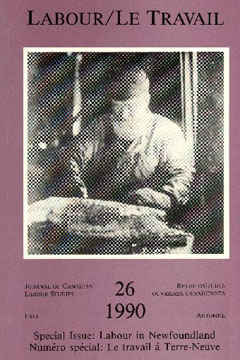Abstract
The early 1930s witnessed the deterioration of truck relationships between fishermen and merchants in Battle Harbour, a Newfoundland fishing community located on the coast of Labrador. By taking advantage of changes in the fishery, more prosperous fishermen began to deal with other firms, undercutting Baine, Johnston's domination of Battle Harbour. As Baine, Johnston withdrew winter credit, poorer fishermen threatened the firm with direct, violent action which neither the merchant nor the state were able to deal with except by granting relief. Such actions by Battle Harbour fishermen indicate that they were able to step outside the supposed limits of the culture of their kin-based villages, and confront directly the exploitation of merchant capital in the cod fishery.
Resume
Située sur la cote du labrador, la communauté terre-neuvienne de Battle Harbour vit la détérioration du système de troc et de crédit transformer les rapports entre pêcheurs et marchands au début des années 1930. Profitant d'un changement dans les pêcheries, les producteurs les plus prospères entreprirent de miner l'emprise de la maison Baine et Johnston en traitant avec d'autres firmes. Moins fortunés, les autres pêcheurs se soulevèrent directement et violemment contre Baine et Johnston lorsqu'on leur retira leurs avances de crédit hivernal, laissant le marchand et l'État sans autre recours que l'octroi de secours publics. Cette confrontation signale que les pêcheurs de Battle Harbour pouvaient franchir les soi-disant limites d'une culture villageoise axée sur les groupes familiaux afin de faire face à l'exploitation du capital marchand dans la pêche à la morue.
